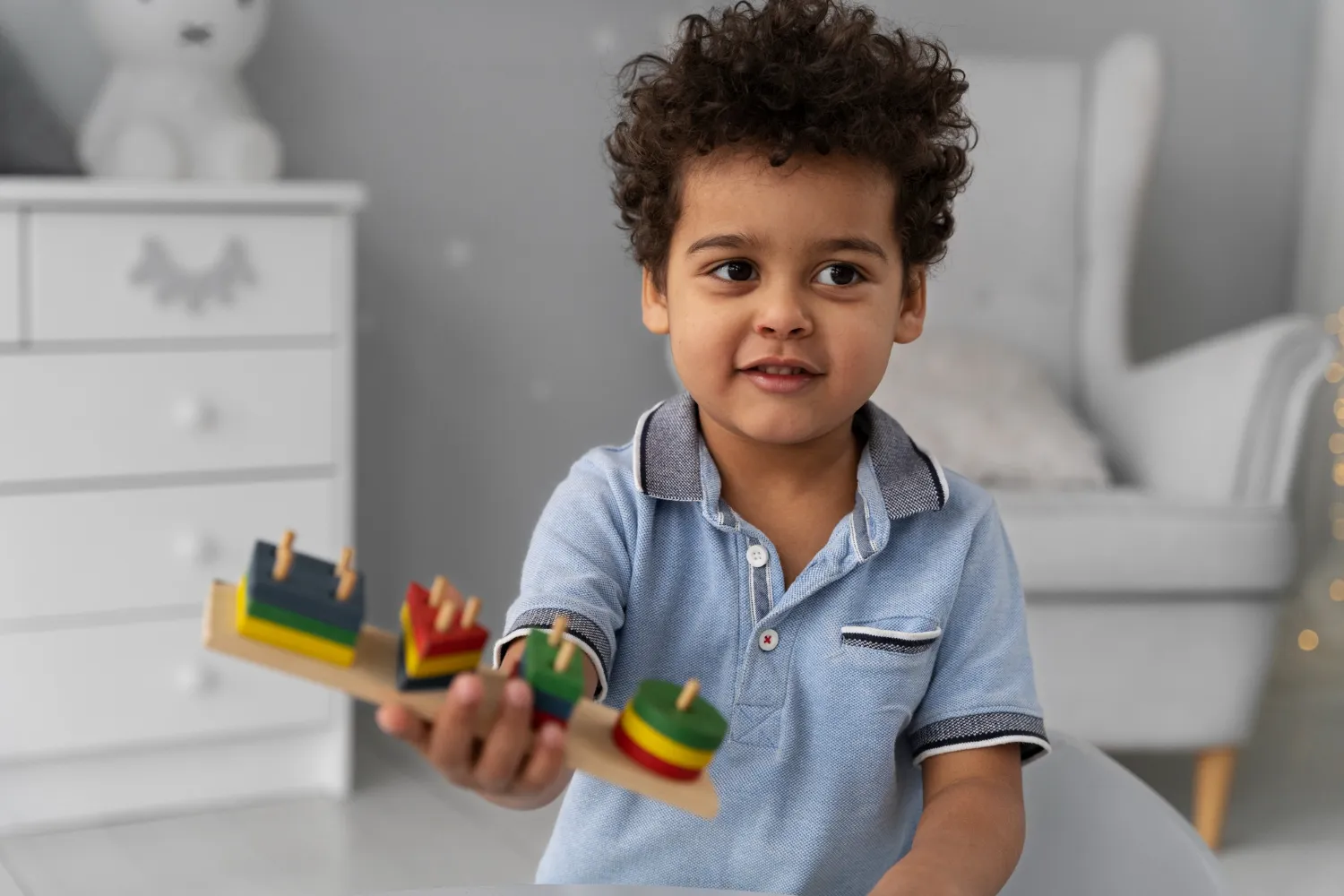Every child’s journey looks a little different. Some take their first steps before turning one, while others wait until closer to 18 months. Some toddlers chatter endlessly, while others may only use a handful of words by age two. These variations are usually part of normal development, but when walking or talking feels delayed, it’s natural for parents to worry.
It’s also common to compare your child to others — siblings, friends’ kids, or children at daycare. Those comparisons often bring up difficult emotions:
- Worry that something might be “wrong.”
- Guilt over whether you’ve done enough to help.
- Self-blame, even when delays aren’t caused by parenting choices.
The important thing to remember is this: milestones are guidelines, not deadlines. Many children who are late to walk or talk catch up on their own. And when extra support is needed, early help from professionals can make a big difference — giving children the tools to thrive and giving parents reassurance along the way.
Understanding Milestones

When your child isn’t walking or talking as early as others, it’s natural to worry. But milestones are guides, not deadlines, and children develop at different rates. Here’s what’s typical — and why there’s often a wide range of “normal.”
Walking:
- Many children take their first steps between 12 and 18 months.
- Some are early movers; others prefer crawling or holding on longer.
- A cautious child may suddenly go from cruising to confident walking in just a few days.
Talking:
- First words often appear around 12 months, but some children use only a handful of words until closer to 18 months.
- By age two, many children combine two words (“more juice,” “daddy go”), but others focus more on understanding than speaking.
- It’s common for comprehension (what they understand) to develop faster than expression (what they say).
What matters most:
- Is your child showing steady progress, even if slower?
- Are they trying to move more, even if not walking yet?
- Do they babble, gesture, or point, even if not speaking clearly?
These signs show that development is happening — just at your child’s pace. Remember, milestones help guide parents and professionals, but every child’s journey looks a little different.
Related: What is NDIS Speech Therapy?
Common Reasons for Delays
If your child isn’t walking or talking when expected, it doesn’t always mean there’s a serious problem. There are many possible reasons, and often they can be supported with the right help.
Physical factors
- Differences in muscle tone, strength, or balance can make walking take longer.
- Premature babies often reach milestones later than peers.
- Some children are simply more cautious and wait until they feel confident.
Communication factors
- Hearing issues (such as frequent ear infections) can affect speech development.
- Some children understand much more than they can express, which makes them appear “quiet.”
- Delays may relate to how the brain processes or produces speech sounds.
Developmental differences
- Delays in walking or talking can be linked to broader differences, such as autism spectrum disorder or global developmental delay.
- Early identification means children can access extra support to thrive.
Environmental factors
- Children learn language by hearing it around them, and practice walking in safe, open spaces.
- Less exposure doesn’t usually cause a delay on its own, but it can contribute.
The key takeaway: every child’s journey is unique. A delay doesn’t define who they are or what their future will look like. What matters most is recognising the signs and seeking support if you’re concerned.
First Steps for Parents
If you’re worried about your child’s walking or talking, the most important thing is to take calm, practical steps. Acting early gives you clarity and can open doors to support if it’s needed.
Here are some first things you can do:
- Observe and record progress – jot down new sounds, gestures, or attempts at movement. These notes help professionals see patterns over time.
- Talk to your GP or child health nurse – they can check your child’s overall development and recommend hearing tests, developmental screenings, or referrals.
- Seek a paediatric assessment if advised – paediatricians can provide a more detailed review and connect you with allied health specialists.
- Encourage skills at home – keep playing, reading, and talking with your child daily. For movement, create safe spaces to practice pulling up or cruising along furniture. For speech, focus on interaction through songs, stories, and conversation.
Asking for help doesn’t mean you’ve failed as a parent — it means you’re giving your child the best possible support for their future.
How Therapy Can Help

Therapies can play a powerful role in supporting children who need a little extra help with walking or talking. Early intervention is especially valuable, as it gives children the chance to build strong foundations during their most important years of development.
Here are some of the key therapies that can make a difference:
- Physiotherapy – supports children with muscle strength, balance, and coordination. A physiotherapist can help a child who isn’t walking by guiding movement, building confidence, and suggesting safe activities to practice at home.
- Speech pathology – helps children develop their communication skills. This might include building vocabulary, improving clarity, supporting children with hearing difficulties, or even working on feeding and swallowing.
- Occupational therapy – focuses on everyday skills, like fine motor development, play, and independence. For children not yet walking or talking, occupational therapy can support sensory needs and help them engage in learning and play.
- Allied health assistants – work under the guidance of therapists to give children more opportunities to practice skills between sessions.
The goal of therapy is not just to “fix” a delay. It’s about giving children — and parents — the tools, strategies, and confidence they need to grow, learn, and connect.
NDIS and Early Intervention
In Australia, families don’t have to face developmental concerns alone. The National Disability Insurance Scheme (NDIS) provides support for children who may need extra help with walking, talking, or other developmental milestones.
For children under 9, the NDIS offers an Early Childhood Approach. This program is designed to give families quick access to the right support without long waiting times. You don’t need a formal diagnosis to get started — if you’re concerned about your child’s development, you can reach out and ask for an early childhood partner in your area.
Through the NDIS, families may be able to access:
- Funding for therapies like physiotherapy, speech pathology, and occupational therapy.
- Support workers or allied health assistants who can help children practice skills at home and in the community.
- Guidance for parents, so you know what to do between sessions to keep your child progressing.
The aim of early intervention is simple: give children the tools and confidence they need to thrive, while reducing the stress on families. Getting support early often makes it easier for children to catch up with their peers and build strong skills for the future.
Coping as a Parent
When your child isn’t walking or talking as expected, the worry can feel overwhelming. It’s easy to wonder if you’ve done something wrong or to blame yourself — but delays are rarely the result of anything a parent has or hasn’t done.
Here are some reminders that can help you cope during this journey:
- Celebrate small wins – every new sound, gesture, or attempt to move forward is progress. Recognising these moments helps shift the focus from what isn’t happening yet to what is developing.
- Stay connected – talk to other parents, family members, or support groups. Hearing “me too” from someone else can ease the sense of isolation.
- Look after yourself – caring for a child with delays can be emotionally draining. Make time for your own wellbeing so you have the energy to support your child.
- Focus on connection, not just milestones – reading together, singing, playing, and simply enjoying each other’s company builds your child’s confidence and strengthens your bond.
Remember, you’re not alone in this. Seeking guidance and support is not a sign of weakness — it’s one of the strongest, most loving things you can do for your child.
Conclusion
Delays in walking or talking can feel worrying, but they don’t define your child’s future. Many children simply take a little longer, and with the right guidance, they often catch up in their own time. What matters most is noticing the signs, seeking support early, and remembering that you’re not alone in this journey.
With therapies like physiotherapy, speech pathology, and occupational therapy — and with the right supports through the NDIS — children can build confidence, develop new skills, and thrive. Parents, too, can feel more supported and empowered when they have a clear plan and a caring team around them.
At Zenzability, our mission is to make sure families feel guided, not overwhelmed. We provide therapy that fits into daily life, practical strategies you can use at home, and a compassionate team that celebrates every milestone alongside you.
If you’re worried about your child’s walking or talking, don’t wait and wonder. Reach out to Zenzability today and let us help you take the next step toward support, clarity, and hope for your child’s future.

